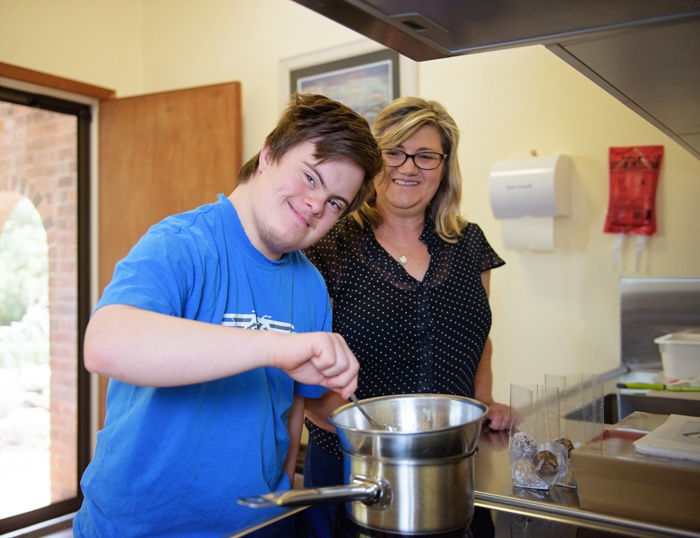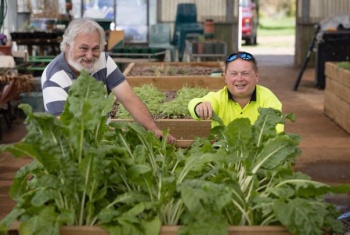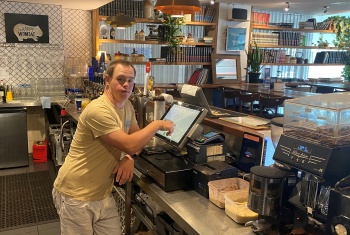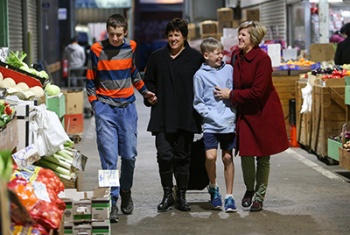This is a story about Ben Hunter, but really it’s just as much about his Mum, Carolyn.
Ben is 21, has Down syndrome and is non-verbal. He’s also the front man of Ben & Co, which began as an enterprise in baking but quickly became a community.
Carolyn Hunter was a chartered accountant before Ben was born, and after Megan and Aidan came along she did a post-grad and became a teacher. When Ben finished school in 2014 she took what she calls “a gap year” and went in search of something that might enrich her eldest son in adulthood. What they arrived at has changed both their lives, and is destined to be just as heart-warmingly transformative for others.
Carolyn has a passion for educating people with disabilities about food. She remembers often seeing the parents of a classmate of Ben’s, who like their child also had an intellectual disability, at the local supermarket. Invariably they’d be in the frozen goods section buying readymade meals. “That encouraged me to teach Ben how to cook, to make sure he had basic skills.”
They were living in Canberra, where Ben’s father Ian was working in defence, when Carolyn came across a course in kitchen operations. Ben had helped out in the canteen at school but always seemed more interested in gardening than cooking. She signed him up anyway, four half days a week alongside six other students. One afternoon Carolyn arrived to collect Ben and he greeted her with a batch of scones. “He was just beaming. I thought, ‘I’d better follow this up.’”
They were about to move to Toowoomba, and their housing wish list was tweaked to include enough space to one day establish a kitchen garden, bore water to service it, and a granny flat. Ben will live there eventually, but for now it’s the Ben & Co coalface, home to a commercial kitchen where muffins and other baked goods are whipped up each week for sale at the local Saturday market. They supply two cafes, too, a number that’s about to grow.
Carolyn’s vision has broadened, but not in a money-making sense. She sees what this engagement has done for her son, and knows it can have the same impact on others. Ben’s thing is cooking, but she wants to also cater for young people with intellectual disabilities for whom gardening lights up their world. “Just imagine if I had a gardener employed, who looked after an acre of veggies, and we could have two or three young adults with disabilities working there, supplying things for Ben & Co to bake with …
“I want to keep this under control, select six or so cafés to supply to that fit our profile. It’s organic growth. We’re not out there to make money, we’re trying to build Ben’s village.”
After the start he had in life, to reach this point of optimistic contentment is remarkable.
Ben was blue at birth, with a heart condition doctors told Carolyn and Ian would most likely kill him within 24 hours. “Down syndrome was secondary – our focus was on him living.” He defied medical expectation, but the trauma was razor raw. “I remember getting to day 11 and celebrating – because it was the first day I hadn’t cried.” Ian was her rock. “He said, ‘Ben didn’t ask to have this, we’ll get him through it.’”
After 23 days in ICU they took him home and were on constant high alert with a baby whose lungs hadn’t properly developed, leaving Carolyn and Ben housebound to avoid the outside world’s germs and bugs. In time, social interactions became visits to the paediatrician, physiotherapists, disability services and social workers.
Carolyn gravitated to families whose children were a decade older than Ben, “just to see how they’d got on”. Immersed in numerous services, she found herself thinking their life was faintly ridiculous – out four days a week with their feet barely touching the ground, while other infants were in a single playgroup and spent the rest of the time at home. “I had a conversation with a social worker who said, ‘But why would you not want to do this?’ And I said, ‘Just to be a family.’ It was the first time she’d heard anyone say that.”
They moved to Adelaide with Ian’s work and embraced the special education system, where Ben’s communication could be supported, his behavioural issues understood, and he could learn in a specialised environment. His understanding and receptor skills have always been strong. Carolyn remembers watching him at playgroup making strange hand movements with other children on the floor, and a speech therapist telling her they were communicating in the same way toddlers do when they babble away at each other. Megan and Aidan were signing before they could speak, a platform that embedded such structure that when they did talk they were able to form full sentences right away.
Volunteering at special school inspired Carolyn’s shift to teaching, and she spent 10 years at a Montessori school. When they moved to Toowoomba she took a leap of faith and posted an ad on SEEK for a “lifestyle mentor”. Pointedly, support workers with no disability background were targeted, “so they didn’t have Ben pigeon-holed from the start”. Forty-eight people responded; they interviewed six and employed two – Nandi and Sarah. One of them is with Ben from 7.30-3.30 five days a week.
“From where Ben was when I started just over a year ago to now, he’s taken massive steps,” says Nandi Schroder, a big, gentle man in his 20s who cooks breakfast with Ben (“he loves his scrambled eggs”), helps with his work at the Abbie Lane Café (clearing and washing tables, cleaning dishes, putting away stock and the like), and has formed a relationship that clearly warms both parties.
“Ben does things I never thought I’d see him do,” Nandi says. “Every day he’ll show me something different. I want to get to the point where he doesn’t need me out the back (of the café) with him. He’s going to make me redundant.”
The pinnacle of Ben’s growing CV, which has made him something of a Toowoomba celebrity, is the Ben & Co stall at the weekly Saturday market. It is the result of Carolyn’s determination to meet any obstacle with an attitude of “why not?”, rather than a plaintive why?
They sought permission for him to join a local centre that was offering a certificate three in hospitality to people with mental health issues who were transitioning back into the workforce, and with Sarah and Nandi’s help Ben completed the training and necessary work experience covering kitchen safety, food hygiene and the like. Nandi sat in on the lectures with Ben, and he and Sarah used images downloaded or cut from newspapers and magazines to join the dots in his learning. “If they wanted to see he could understand a concept, they’d actually act it out to see that Ben knew what he was meant to do,” Carolyn says.
Work experience was a requirement of the certificate, so the owners of the Abbie Lane Café eased Ben in with shifts on their quietest day. By accident he was rostered on the day the local “Red Hatters”, a society for women over 50, had the place buzzing. He clicked up a gear, was engaged in all he did and much happier for the challenge. Now, Ben works on the busy days.
A symbol-supported communication iPad app, called Proloquo2go and requiring the navigation of several layers of images before a message is verbalised, highlights what Carolyn terms her son’s “situational” behaviour. He uses it beautifully with his speech therapist, telling her jokes about a co-worker dropping plates at the café, or how much he enjoys making money. But he won’t use it at home. The Hunters are positive people. “We hope conversation will happen. After 21 years we’re still persisting, we believe it will happen.”
Regardless Ben continues to achieve, helping with the cooking in the granny flat at home, setting up the stall at the Saturday market, charming the customers. She’s amazed by how many locals know how to sign (a function of prior contact with a deaf local), and the instant connection Ben makes with them. “They’ll turn up, order by signing, and Ben’s face just lights up. ‘Someone’s speaking my language!’ He says ‘thank-you’, or ‘shoo’ – he does shoo people away.”
He’s also intuitively switched on to retail. “Say we’ve got six varieties of muffins, if the pineapple-coconuts aren’t selling as well as the red velvets and someone comes up and asks, ‘Ben, what’s your favourite?’, he’ll point to the pineapple-coconuts.”
Now, Nandi or Sarah accompany Ben on fact-finding tours of local cafes and shopping centres, looking for ideas and handing out business cards to potential clients. A knock-on effect of his work is the safety net of routine it builds, that as the Toowoomba community gets to know Ben they’ll also look out for him. “Part of what we’ve been told is to establish a routine where he’s somewhere every day, so if he doesn’t turn up there’s a community that says, ‘Where’s Ben?’”
Carolyn has curriculum written and ready to go for the next phase – a regular cooking class, where young adults like Ben can learn basic nutrition skills. They’re already outgrowing the granny flat; in the next 12 months she hopes to find a commercial kitchen and kick off with a couple of sessions a week.
Asked what people tell her about what she’s doing for Ben – what she’s about to do for others – she palms off the compliments. Inspirational? “No. Really, I’m just giving Ben a purpose.”



